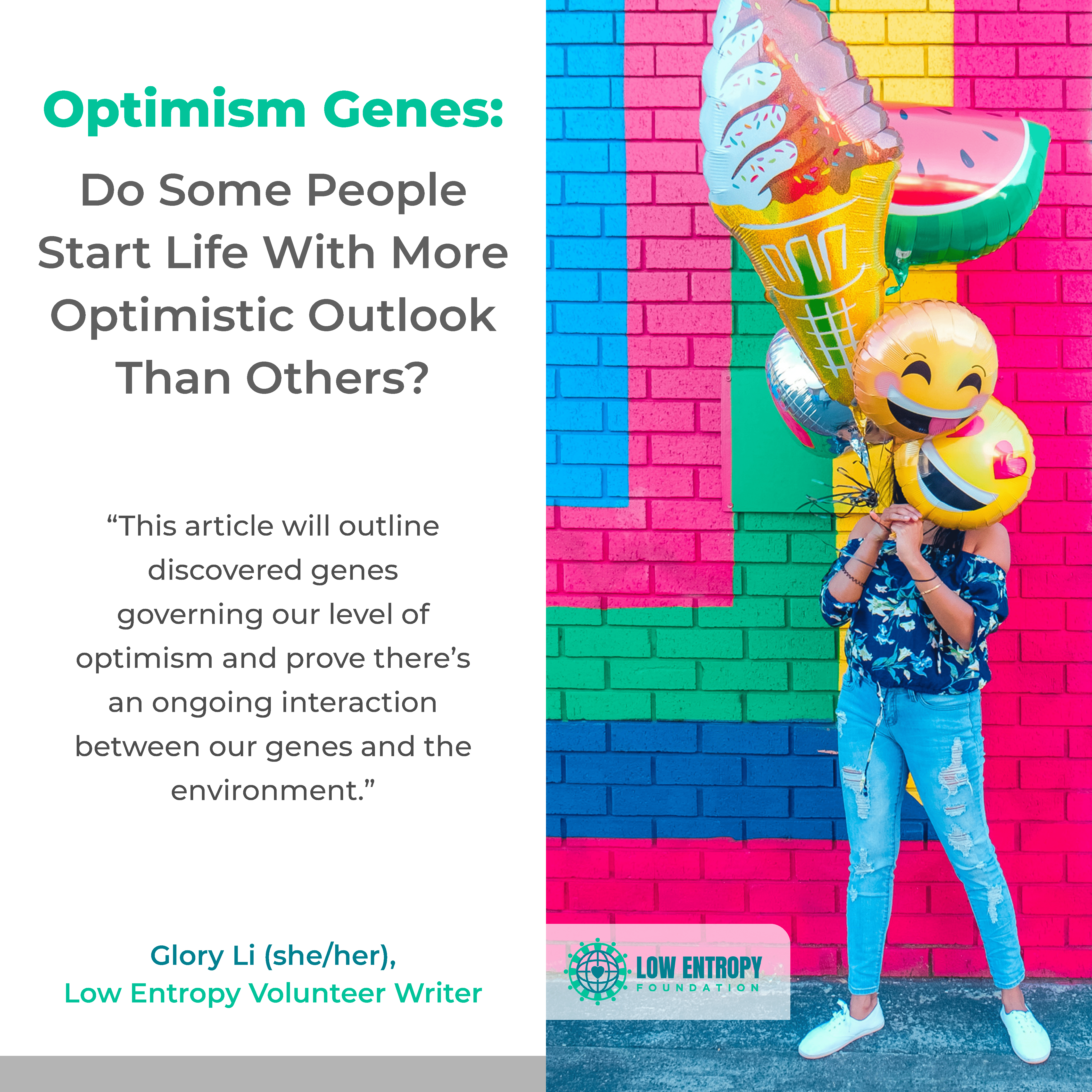Optimism Genes: Do Some People Start Life With More Optimistic Outlook Than Others?
November 25, 2023

Glory Li (she/her), Volunteer Writer
Genetic outcomes can result in a natural, inherent tendency to respond in a certain personality, but that doesn’t mean we will always react or present ourselves in the same demeanour in any situation. Even if two people both carry an equally optimistic gene, it’s probable to feel more energetic if one grew up in a healthy family dynamic in contrast to another labouring for housework and homework at the same time, making it harder to be optimistic. This article will outline discovered genes governing our level of optimism and prove there’s an ongoing interaction between our genes and the environment.
Two well-known genes that controlled optimism level:
- Dopamine D4 receptor gene (DRD4),[1] is a gene that encodes the level of dopamine in our brain. Elevated moods have been associated with the efficiency of our brain’s dopamine production and degradation. A tiny change — known as single nucleotide polymorphism (SNAP) — in the normal DNA sequence of this receptor gene will lead to either an increased or decreased desire to engage in pleasurable activities like eating chocolates or heavy consumption of alcohol. By being engaged in recreations that bring us joy will create a positive emotional response and divert our attention from pessimistic thoughts.
- Serotonin transporter gene,[2] moderate the level of serotonin in the brain by producing transporter proteins to eliminate excess serotonin byproducts from the brain. There are two major genetic variations of the gene: the LL version can absorb and recycle serotonin quickly and the SL version is a slow-paced gene, giving the carrier a weakness for depression that only appears if their environment turned out for the worst. As pessimism is frequently the result of fear and anxiety, people with the SL version experience increased activation of their amygdala or the fear-control centre. They were quicker to locate the position of dangerous objects or scary scenes, at the same time the fastest to locate positive things when events turned favourable. Again, the risk or benefit derived from the very same genes oscillates depending on whether the environment goes right or wrong for an individual.
How Was Optimism Mutually Affected by Genes and Environment?
Having the exact codes encoding a positive pattern of thinking doesn’t mean the optimistic trait will be expressed as the gene can always be silenced[3] in response to abrupt environmental changes or chronic exposure to an unfavourable environment. For instance, Professor Ian Weaver[4] studied the gene expression of infants with cold or caring mothers and the impact on their offspring’s ability in handling anxieties. Anxiety and stress has been largely linked to pessimism and depression, so babies receiving poor maternal care have less stress-regulating receptors in the brain meaning that it takes them a longer time to get over the experienced trauma.
The argument goes that having a good environment before puberty will likely exert the strongest effect on instinctive behaviours like having a positive mindset. However, research found an adoptee shared more similarities with their adoptive parents than their biological, genetically-related parents while they were still underaged, but that the parental influence decreased as the child grows up which means that despite living in either a nourishing or an indifferent environment, it would not turn a child into a genius nor a criminal[5]. This analysis indicates that despite environmental influences having authority over gene expression, our optimism is not completely dependent on our backgrounds and the people surrounding us.
This paradox of whether environmental or genetic influences play a greater role in optimism is a “chicken or the egg” question because it varies depending on the individual and the two factors correlate in a complicated relationship. The optimism we experience is evenly divided between our genes and the environment, but if only these unshared environments are considered uncontrollable, we can choose how we face the environment since our decisions in these environments would also change our situational disposition and our genetic expressions down to the core.
Work Cited
[1]Ptáček, Radek, et al. “Dopamine D4 Receptor Gene DRD4 and Its Association With Psychiatric Disorders.” PubMed Central (PMC), 1 Sept. 2011, https://doi.org/10.12659/MSM.881925.
[2]Houwing, Danielle J., et al. “The Serotonin Transporter and Early Life Stress: Translational Perspectives.” Frontiers, 7 Apr. 2017, https://doi.org/10.3389/fncel.2017.00117.
[3]“Silence Therapeutics – Patients – Gene Silencing Explained – Gene Silencing: The Basics.” Silence Therapeutics – Patients – Gene Silencing Explained – Gene Silencing: The Basics, silence-therapeutics.com/ patients/gene-silencing-explained/gene-silencing-the-basics/default.aspx.
[4]Fox, Elaine. Rainy Brain, Sunny Brain: How to Retrain Your Brain to Overcome Pessimism and Achieve a More Positive Outlook. 2012.
[5]Stangor, Charles, and Jennifer Walinga. “12.3 Is Personality More Nature Or More Nurture? Behavioural and Molecular Genetics – Introduction To Psychology – 1st Canadian Edition.” 12.3 Is Personality More Nature Or More Nurture? Behavioural and Molecular Genetics – Introduction To Psychology – 1st Canadian Edition, opentextbc.ca/introductiontopsychology/chapter/11-3-is-personality-more-nature-or-more- Nurture-behavioural-and-molecular-genetics.
—
Leave your thoughts for Glory in the comments below. You can also follow us on Facebook, Instagram, TikTok, Twitter and YouTube to stay up-to-date with Low Entropy news!
GET INVOLVED
At Low Entropy, we believe changing the world starts with changing ourselves.
Founded in 2015, Low Entropy Facilitates conversations that encourage diversity and promote inclusivity.
We understand that life can be confusing at times. It can seem challenging and sometimes you may feel like no one really “gets you.” We offer an opportunity to connect with others who have the capacity to understand you.









